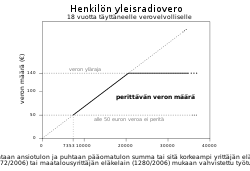
You can help expand this article with text translated from the corresponding article in Finnish. (June 2023)Click [show] for important translation instructions.
|
The Yle tax (Finnish : yleisradiovero, [1] Swedish : rundradioskatt [2] ) is a Finnish tax collected to fund the operation of the country's public broadcasting company, Yle. The tax has been collected since 2013, when it replaced the television licence payment (televisiomaksu, televisionsavgift). Rates vary from €0 to €163 a year, depending on the amount of taxable income an organization has. [3]